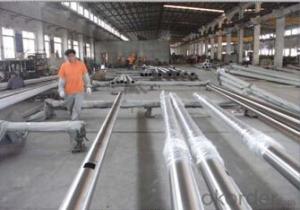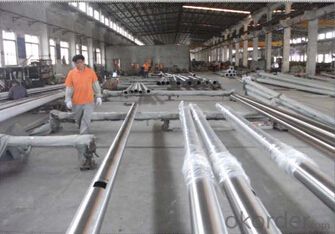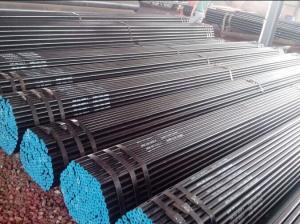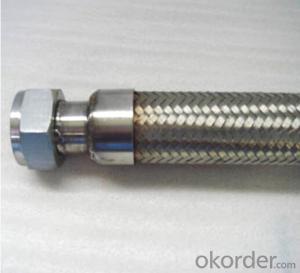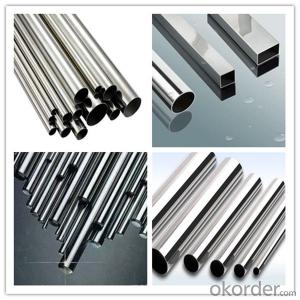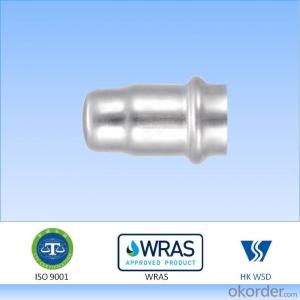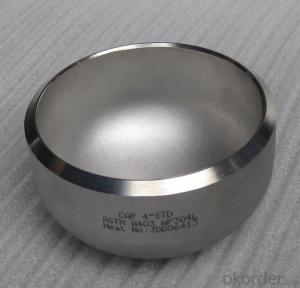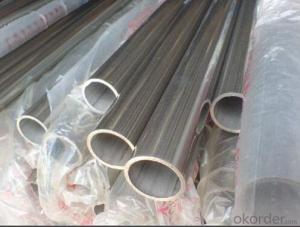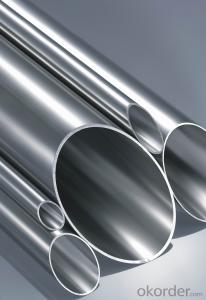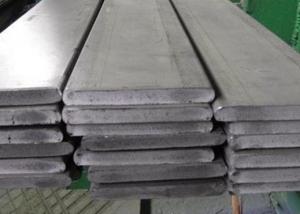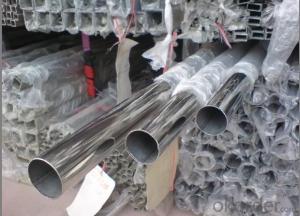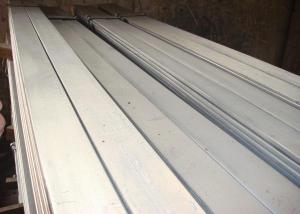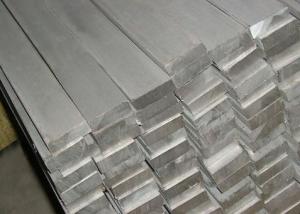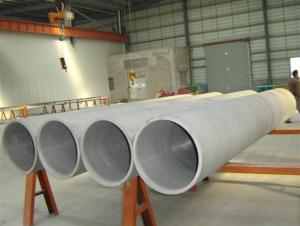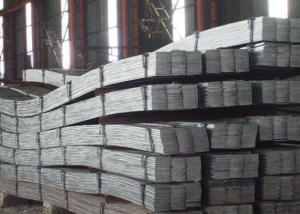FEED WATER STAINLESS PIPE 304
- Loading Port:
- China Main Port
- Payment Terms:
- TT OR LC
- Min Order Qty:
- -
- Supply Capability:
- -
OKorder Service Pledge
Quality Product, Order Online Tracking, Timely Delivery
OKorder Financial Service
Credit Rating, Credit Services, Credit Purchasing
You Might Also Like
Specifications
1. Guaranteed material from established steel factories2. Accordance with International standard
3. Attractive 304 316price
PRODUCT NAME: 304 FEED WATER PIPE
| Name | 304 FEED WATER PIPE |
| Standard | ASTM, GB, JIS, DIN, EN, AISI |
| Material Grade | TP304 TP304L TP316 TP316L TP347 TP347H TP321 TP321H TP310 TP310S |
| TP410 TP410S TP403 | |
| S31803/S32205 S32750 S32760 | |
| Outer Diameter | Welded Pipe: single slit(Φ8mm-Φ630mm); girth(Φ630mm-Φ3000mm), |
| Thickness | Welded Pipe: single slit(0.5mm-25mm); girth(3mm-30mm) |
| Length | Commonly 5.8 Meters or 6.0 Meters, or as customers' request |
| Tolerance | According to the Standard, +/-10% Commonly. |
| Surface | 180#, 320#, 400# Satin / Hairline, Bright Anneal, Pickle,400#, 500#, 600# or 800# Mirror finish |
| Application | Petrochemical industry, chemical fertilizer industry, oil refining industry, oil and gas industry, light industry and food industry, pulp and paper industry, energy and environmental industries. |
| Test | Flaring test, Flattening test, Bending Test, Hydraulic Test, Eddy Current test |
- Q: Can stainless steel pipes be used for exhaust systems?
- Yes, stainless steel pipes can be used for exhaust systems. They are commonly used due to their excellent corrosion resistance, high temperature tolerance, and durability. Stainless steel pipes can withstand the harsh conditions of exhaust gases and provide a long-lasting and efficient solution for exhaust systems.
- Q: Are stainless steel pipes suitable for automotive exhaust systems?
- Yes, stainless steel pipes are highly suitable for automotive exhaust systems. They offer excellent corrosion resistance, durability, and heat resistance, making them ideal for withstanding high temperatures and harsh conditions that exhaust systems endure. Additionally, stainless steel pipes provide better performance, improved fuel efficiency, and can enhance the overall aesthetic of the vehicle.
- Q: How do you prevent rusting in stainless steel pipes?
- There are several measures that can be taken to prevent rusting in stainless steel pipes: 1. Keeping the pipes clean regularly is important. Use mild soap or detergent and warm water to remove dirt, debris, and contaminants that can cause corrosion. 2. Avoid using abrasive cleaners, steel wool, or harsh chemicals as they can scratch the surface of the stainless steel and compromise its protective layer. 3. Protect the pipes from exposure to chlorides, such as those found in saltwater or certain cleaning agents. If the pipes are installed in areas with these substances, apply protective coatings or use specialized stainless steel grades that are resistant to chloride-induced corrosion. 4. Proper ventilation is crucial to prevent moisture buildup, which can accelerate the rusting process. Ensure that the stainless steel pipes have adequate airflow to keep them dry and reduce the risk of corrosion. 5. Regularly inspect the pipes for signs of rust or corrosion. If any damage or rust spots are detected, address them promptly to prevent further deterioration. 6. Consider passivation, a chemical treatment process that enhances the corrosion resistance of stainless steel. This involves removing contaminants from the surface and promoting the formation of a protective oxide layer. It is recommended to have professionals with experience in handling stainless steel perform the passivation process. 7. In certain cases, cathodic protection can be used. This involves using sacrificial anodes or impressed current systems to create an electrochemical reaction that protects the stainless steel from corrosion. By following these preventive measures, the risk of rusting in stainless steel pipes can be significantly reduced, ensuring their longevity and durability.
- Q: Can stainless steel pipes be used for underground applications?
- Yes, stainless steel pipes can be used for underground applications. Stainless steel is highly resistant to corrosion, making it an ideal material for underground installations where the pipes are exposed to moisture, soil, and other corrosive elements. Stainless steel pipes are commonly used in underground applications such as water supply, sewage systems, and gas pipelines. Additionally, stainless steel pipes have high strength and durability, making them suitable for withstanding the pressures and loads associated with underground installations.
- Q: What are the different types of stainless steel pipe caps?
- Various industries utilize different types of stainless steel pipe caps for various purposes. There are several common types: 1. Welded Pipe Caps: These caps are welded onto the pipe's end to create a secure and leak-proof seal. They are ideal for high-pressure applications that require a robust connection. 2. Threaded Pipe Caps: These caps have internal threads that allow them to be screwed onto a threaded pipe's end. They are commonly used in low-pressure applications and can be easily removed for maintenance or cleaning. 3. Socket Weld Pipe Caps: These caps have a socket on one end that fits over the pipe's end and is then welded to create a tight seal. They are typically used in high-temperature and high-pressure applications. 4. Butt Weld Pipe Caps: These caps are similar to socket weld caps, but instead of a socket, they feature a butt weld connection. They are commonly used in large-diameter pipes and are renowned for their strength and durability. 5. Compression Pipe Caps: These caps are designed for use with compression fittings, which are frequently used in plumbing and gas supply systems. They provide a tight seal without requiring welding or threading. 6. Flanged Pipe Caps: These caps have a flange on one end that allows them to be bolted onto a flanged pipe's end. They are often used in piping systems that necessitate frequent disassembly and reassembly. Each type of stainless steel pipe cap offers its own advantages and is suitable for specific applications. It is crucial to select the appropriate cap based on the project requirements to ensure a proper and secure fit.
- Q: What is the difference between seamless and double submerged arc welded stainless steel pipes?
- Seamless stainless steel pipes are produced by rolling a solid cylindrical billet of stainless steel after it has been pierced, ensuring a smooth surface without any welds or seams. This manufacturing process gives the pipes higher strength and corrosion resistance due to the absence of potential weak points created by welding. On the other hand, double submerged arc welded stainless steel pipes are made by aligning and welding two separate steel plates using a submerged arc welding process. This welding method uses a flux to protect the weld area from atmospheric contamination. The plates are then joined together to form a pipe by passing them through rollers. These pipes have a visible weld seam along their length. Seamless stainless steel pipes are preferred in applications where high pressure, high temperature, or corrosive environments are present. They eliminate the risk of leakage and enhance the overall structural integrity of the pipe. In contrast, double submerged arc welded stainless steel pipes are often chosen for their cost-effectiveness. They are less expensive to produce compared to seamless pipes and are commonly used in industries such as oil and gas, petrochemical, and water distribution. In conclusion, the main difference between seamless and double submerged arc welded stainless steel pipes lies in their manufacturing process and resulting characteristics. Seamless pipes have a smooth and continuous surface without any welds or seams, while double submerged arc welded pipes have a visible weld seam. The choice between these types of pipes depends on factors such as cost, application requirements, and the desired level of strength and corrosion resistance.
- Q: Can stainless steel pipes handle acidic or alkaline fluids?
- Yes, stainless steel pipes can handle both acidic and alkaline fluids. Stainless steel has excellent corrosion resistance properties, making it suitable for various applications involving these types of fluids.
- Q: What's the difference between stainless steel seamless tube and stainless steel welded pipe?
- Stainless steel seamless pipe featuresFirst, the product of the wall is thicker, it is more economical and practical, the wall thickness of the thinner, processing costs will be substantially increased it; secondly, the product process to determine its performance limitations, generally low precision seamless steel pipe: uneven thickness, tube inner surface brightness low and high cost of fixed length, and the inner surface pitting and black spots difficult to remove; the detection and plastic third, must be processed offline. Therefore, it has its advantages in high pressure, high strength, mechanical structure and timber.
- Q: How do you prevent contamination in stainless steel pipes?
- To prevent contamination in stainless steel pipes, it is crucial to follow a few important steps. Firstly, regular cleaning and maintenance are essential. This involves using appropriate cleaning agents and techniques to remove any dirt, debris, or potential contaminants from the pipes. It is important to avoid using abrasive materials or harsh chemicals that can damage the stainless steel surface. Secondly, ensuring proper installation and sealing of the pipes is crucial. Any gaps or leaks in the connections can allow contaminants to enter the system. It is advisable to use high-quality fittings and seals to ensure a tight and secure connection. Thirdly, implementing a comprehensive filtration system can help prevent contamination. Filters can remove impurities such as sediments, particles, and other contaminants that may be present in the fluid or gas flowing through the pipes. Regularly inspecting and replacing these filters is important to maintain their efficiency. Additionally, regular inspection and monitoring of the pipes is essential. This includes checking for signs of corrosion, rust, or any other damage that can compromise the integrity of the pipes. Promptly addressing any issues that arise can prevent contamination and extend the lifespan of the stainless steel pipes. Lastly, it is crucial to establish and follow proper hygiene practices. This includes implementing procedures to minimize the introduction of contaminants during maintenance or repairs. It is also important to train personnel on proper handling techniques and the importance of maintaining cleanliness and hygiene when working with stainless steel pipes. By following these preventive measures, it is possible to minimize the risk of contamination in stainless steel pipes, ensuring the integrity and longevity of the system.
- Q: What is the difference between Schedule 5 and Schedule 10 stainless steel pipes?
- Schedule 5 and Schedule 10 stainless steel pipes are both commonly used in various industries and applications, but there are some key differences between the two. The main difference lies in their wall thickness. Schedule 5 stainless steel pipes have a thinner wall thickness compared to Schedule 10 stainless steel pipes. This means that Schedule 5 pipes have a higher internal diameter, allowing for a greater flow of fluids or gases through the pipe. Schedule 10 stainless steel pipes, on the other hand, have a thicker wall thickness, resulting in a smaller internal diameter. This makes them more suitable for applications that require higher pressure or strength, as the thicker walls provide increased durability and resistance to external forces. Additionally, the different wall thicknesses of Schedule 5 and Schedule 10 pipes affect their weight and cost. Due to the thinner walls, Schedule 5 pipes are lighter and less expensive than Schedule 10 pipes. In terms of availability, Schedule 10 stainless steel pipes are more commonly used in industrial processes that involve high pressure or corrosive environments, such as chemical plants or oil refineries. Schedule 5 stainless steel pipes are often used in applications where the flow of fluids or gases is not under extreme pressure, such as plumbing or low-pressure conveying systems. In summary, the main differences between Schedule 5 and Schedule 10 stainless steel pipes lie in their wall thickness, internal diameter, strength, weight, and cost. The choice between the two depends on the specific requirements of the application and the level of pressure or durability needed.
Send your message to us
FEED WATER STAINLESS PIPE 304
- Loading Port:
- China Main Port
- Payment Terms:
- TT OR LC
- Min Order Qty:
- -
- Supply Capability:
- -
OKorder Service Pledge
Quality Product, Order Online Tracking, Timely Delivery
OKorder Financial Service
Credit Rating, Credit Services, Credit Purchasing
Similar products
Hot products
Hot Searches
Related keywords
